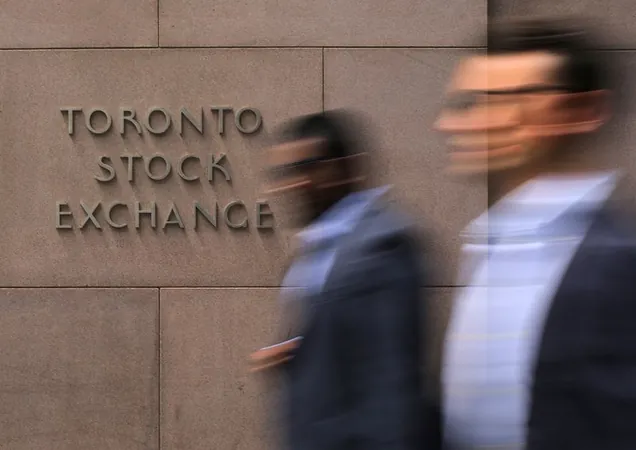
TSX Takes a Dive: Is This the End of the Bull Market?
2025-01-10
Author: Benjamin
Canada’s stock market faced a significant setback on Friday, experiencing its largest drop in over three weeks. The Toronto Stock Exchange's S&P/TSX composite index plummeted 305.63 points, or 1.2%, closing at 24,767.73. This marked its lowest closing level of the year and the most notable decline since December 18. After an impressive surge of nearly 18% in 2024, the index has now recoiled from its December peak.
The downturn comes on the heels of rising bond yields, indicating a stronger-than-expected economy, which has led investors to cash in on profits from recent gains. Rising yields on government bonds often signal expectations of economic growth, but they can also deter equity investments as borrowing costs rise.
Joseph Abramson, co-chief investment officer at Northland Wealth Management, suggested that this pullback should be viewed as a counter-trend move rather than an indication of a bear market. “As bond yields have been increasing, stocks have been having a pullback. But very importantly, the rise in bond yields is reflective of improving growth,” he explained.
The downturn wasn’t isolated to Canada. U.S. stock markets also experienced declines amid similar concerns, with the yield on the U.S. 10-year note reaching its highest level since November 2023 at 4.790%. The latest labor market report from the U.S. indicated an unexpected acceleration in job growth during December, strengthening expectations that the Federal Reserve will maintain interest rates steady in its next meeting.
In Canada, job growth also surprised many as the economy added 90,900 jobs in December, defying predictions. Nevertheless, investors seem to anticipate another rate cut from the Bank of Canada during its upcoming meeting on January 29.
The TSX sector performance was varied, with real estate and financials suffering losses of 1.8% each, while the tech sector fell by 1.4%. However, energy stocks emerged as a silver lining, climbing 1.1% as oil prices soared by 3.6%, settling at $76.57 per barrel, largely due to new sanctions imposed by the Biden administration targeting Russian oil and gas revenues.
Among the sectors, consumer discretionary was the only one that experienced a notable rise, thanks to Aritzia Inc, which saw its shares jump by a staggering 19.1% after posting quarterly results that exceeded analyst expectations.
As market trends continue to evolve, stakeholders are left questioning whether this decline is merely a blip in an ongoing bull run or a sign of more substantial corrections to come. Investors are urged to stay alert as volatility is anticipated in the coming weeks.









 Brasil (PT)
Brasil (PT)
 Canada (EN)
Canada (EN)
 Chile (ES)
Chile (ES)
 Česko (CS)
Česko (CS)
 대한민국 (KO)
대한민국 (KO)
 España (ES)
España (ES)
 France (FR)
France (FR)
 Hong Kong (EN)
Hong Kong (EN)
 Italia (IT)
Italia (IT)
 日本 (JA)
日本 (JA)
 Magyarország (HU)
Magyarország (HU)
 Norge (NO)
Norge (NO)
 Polska (PL)
Polska (PL)
 Schweiz (DE)
Schweiz (DE)
 Singapore (EN)
Singapore (EN)
 Sverige (SV)
Sverige (SV)
 Suomi (FI)
Suomi (FI)
 Türkiye (TR)
Türkiye (TR)